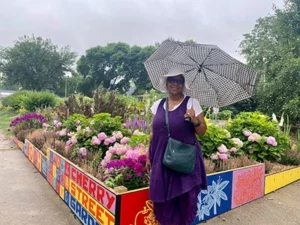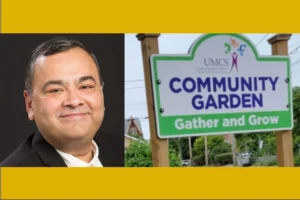Milwaukee’s segregated citizens have been the victim of slow violence for decades.
“(Slow violence) is the kind of disaster that is so slow, so normalized, you don’t think of it as violence. So you think that poor neighborhoods obviously have a lot of potholes and broken windows and boarded up houses and empty lots because they’re poor, right? But it’s produced, and it’s produced over a long period of policies,” said UWM associate professor of history Arijit Sen.
Sen has made it his life’s work to not only document that violence, but also the ways in which the residents of the city’s segregated neighborhoods are finding creative, hopeful ways to fight back, one block at a time.
Now, his work will be part of a traveling national showcase that highlights how “frontline” communities have borne the brunt of economic and climate disparities. The show, called “Climates of Inequality: Stories of Environmental Justice,” is a project by the Humanities Action Lab, a network of universities that collaborate to produce community-curated public humanities projects about pressing social issues.
The exhibit will be on display at the Milwaukee County Historical Society April 8 through May 25. The show features the work of Sen’s Buildings-Landscapes-Cultures (BLC) Field School, which has been an active partner in Milwaukee neighborhoods like Sherman Park, Midtown, Washington Park, and other areas for more than a decade.
What’s on display?
Sen smiles as he describes the event: The Historical Society has devoted most of its beautiful building to the exhibition. When visitors walk up the building’s steps, the first thing they’ll see is the “Climates of Inequality: Stories of Environmental Justice” national exhibition. That display features a large screen describing what climates of inequalities are. The Historical Society building also has several alcoves, where there are more interactive displays highlighting environmental justice efforts in different cities across America, including Milwaukee.
Across the building is the local display, featuring work by Sen and his students in the BLC Field School, which he founded 12 years ago as public history project. In Field School, UWM students – many are drawn from architecture, English, history, and urban studies – are asked to tour neighborhoods, especially marginalized communities, and collect the stories of people who live there. The students use these oral histories as a starting point for creating podcasts, story maps, zines, and other materials to amplify their voices.
Sen has divided the work up into three categories to display: Food Justice, Housing Justice, and urban guardians. This local portion of the display is titled, “This Unfinished Project.”
- Food Justice
Many neighborhoods in Milwaukee are “food deserts,” meaning that there are no dedicated grocery stores or places to buy fresh, healthy produce. There are convenience stores that offer quick, cheap, processed food, but it’s hard to meet the body’s nutrition needs with that kind of fare.
To fight back, several neighborhood activists independently created community gardens, like the Cherry Street Garden that is highlighted in the exhibit. Not only do these gardens grow fresh food that feeds the residents nearby, they also create a safe space where Milwaukeeans can come together to pool their resources and work as part of something bigger than themselves.

“We don’t want people to see a garden the same way again,” Sen explained. “We can them to see the garden as ecology, as memory space, as labor, as resistance. … In each of these neighborhoods we work with we’ve mostly been working with elder women, because they are the ones who are active as community guardians, transforming the neighborhood keeping it safe, bringing the kids together, and having intergenerational communication. One of the things we noticed is each of them had a community garden. … All these there were three different gardens we’ve worked with in the three different neighborhoods, and they all came together. And I stood there and I watched a set of gardeners who have never met each other suddenly exchange notes and figure out they’re right next to each other. That’s the nature of segregation.”
This area features pictures of the gardeners and their gardens, a redone garden bed, and also includes an enormous board showing 300 portraits with QR codes that links to interviews with those people on the BLC Field School’s website.
2. Housing Justice
It’s easy to dismiss certain areas of Milwaukee as ‘blighted.’ Like many other urban centers across the country, it has a sordid history of redlining, racist housing covenants, and urban renewal projects that came at the expense of the city’s Black residents, in particular. The echoes of those policies are still felt today.
The Housing Justice portion of the exhibit tells the story of Milwaukee’s Centerpiece neighborhood, said Sen, and “the people who are transforming it through rehab, intergenerational housing, sweat equity housing – they’re strategies by which housing has become a tool to fight injustice.”
Here, there are five listening stations where guests can hear two podcasts and four interviews with “community guardians” who are leading housing justice movements. There is also a game to help people understand gender and use of space – how houses are places of identity, rather than inert spaces.
3. Urban Guardians
For years, Sen and his students have collected stories and recorded histories from the people who live in the neighborhoods where the BLC Field School has worked. This portion of the exhibit display those biographies, covering the lives of everyday people from Sherman Park, Washington Park, Midtown, and Martin Drive E., all of whom are doing extraordinary work in an effort to protect their communities and help them thrive.
When visitors to the exhibit view these displays, Sen hopes it will make them think about their own roles in the “unfinished work” that is building America. The phrase is drawn from Lincoln’s Gettysburg address, and charges each generation to grow their nation.
“What role can you play? Don’t just tell stories, don’t just hear stories, but bring people together around storytelling to make them act in unison,” Sen said. “That has been my motto for a long time: Making history do work.”
Programming above and beyond
Undertaking such an exhibit is a big job by itself, but Sen has even greater ambitions. Thanks to generous funding from UWM’s Office of Diversity, Equity, and Inclusion, he’s also planned a series of programs to coincide with “Climates of Inequality.” They are:
- April 4, 11-2 p.m., Golda Meir Library 4th Floor Conference Room
“Doing Oral History Under Difficult Circumstances: Ethics, Affect, and Trauma”
This workshop will bring together students, scholars, and community experts around the topic of collecting, interpreting, and using oral histories and testimonies of people whose histories may be under-represented in mainstream media and scholarly archives.
Panelists include Kavita Panjabi, Portia Cobb, Xin Huang, Chia Youyee Vang, and Lynne Worhle.
- April 11, 6 p.m., Milwaukee County Historical Society
“A History of Black Milwaukee”
Historian John Gurda speaks about the history of the city’s Black residents. Tickets are $10 and registration is required.
- April 25
Naturalization Ceremony at the Milwaukee County Historical Society for immigrants becoming U.S. Citizens.
- April 27, 11-12:30, Milwaukee County Historical Society
“Collecting Voices”
A discussion about collecting oral histories with James Levy, Kitonga Alexander, Sandra Jones, Mike Carriere, and Arijit Sen.
- May 3, 2:30-6 p.m., Milwaukee City Hall
City Hall Symposium
A pop-up exhibit and a panel discussion will gather community leaders and city officials to explore why community voices are important and how they should be heard. A student poster session will explore senior capstone projects and graduate student projects examining important issues facing Milwaukee.
Speakers include Supreme Moore Omokunde, Wisconsin State Assembly representative; Evan Goyke, Wisconsin State Assembly representative; Stephanie Harling, Havenwoods Neighborhood Partnership, Executive Director; Lafayette Crump, City of Milwaukee Commissioner of City Development; Camille Mays, Peace Garden MKE, Community Healer, Community organizer; and Sharaka Berry, Community organizer.
- June 1, 11 a.m.-1 p.m., Unity Orchard
Gardeners’ Summit
Meet to hear stories from gardeners at three local gardens and other food activists.
The “Climates of Inequality: Stories of Environmental Justice” is open to the public.
By Sarah Vickery, College of Letters & Science
